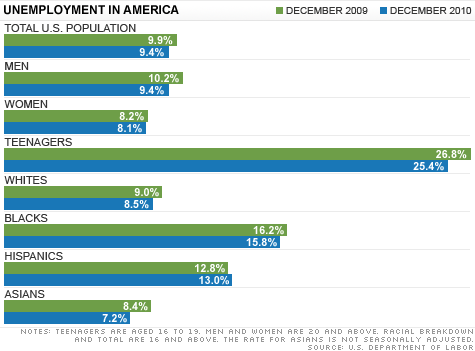Search News

NEW YORK (CNNMoney) -- The employment situation has improved overall over the last year, but large swaths of the U.S. population are lagging behind, including blacks, Hispanics and teenagers.
"Workers are on a jobs ladder. Where you are on that ladder depends on your education, your race, your gender," said William Rodgers, professor of public policy and chief economist at the Heldrich Center for Workforce Development at Rutgers University.
The overall unemployment rate dipped to 9.4% in December 2010, compared to the year-ago rate of 9.9%, the U.S. Department of Labor reported on Friday.
The employment situation for women improved only slightly over the last year, but their total unemployment rate remains lower than men's. Men made a much more impressive recovery, closing some of the gap.
The unemployment rate for adult men dropped to 9.4% during 2010, down from 10.2% in December 2009. The unemployment rate for adult women was nearly unchanged during the same period, showing only the slightest improvement from 8.2% to 8.1%.
That's a consequence of what Rodgers termed a "mancession," with male-centric industries like construction and manufacturing suffering the most during the recession. Women are heavily concentrated in industries like healthcare and education, which grew.
Teenagers continue to suffer the highest unemployment rate, topping 25%. Younger workers are typically the least equipped to compete in the job market, because they generally have the lowest skill and education levels.
Among adults, blacks face the highest levels of unemployment: 15.8% in December 2010, down only slightly from a year ago. That compares to a 13% unemployment rate for Hispanics, 8.5% for whites and 7.2% for Asians.
Economists say much of the disparity can be traced to differing education levels.
"Asians are the most educated, so when you have the largest pool of workers, employers are going to pick the most qualified," said Alicia Robb, research associate in economics at the University of California in Santa Cruz and a senior research fellow at the Kauffman Foundation. "A lot of it is just coming down to the experience and education of workers. Since blacks and Hispanics have lower levels of both, they're the last to be hired."
But that's not the whole story. Rodgers said that minorities tend not to live where job growth is occurring.
"Many minorities, particularly the less educated and less skilled, are concentrated in urban areas, yet much of the job creation over the past decade has been in suburbs," he said.
The problem of racial disparity and unemployment tends to feed itself. Unemployed minorities face greater challenges in developing work experience and networking with contacts, Rodgers said. This means they're often "the first out and last in" during times of recession.
Also, blacks are still being held back by discrimination, economists say.
"Study after study shows that the white college graduate is more likely to get the job, even if they have exactly the same resume [as the black applicant]," said Rob Fairlie, professor of economics at the University of California in Santa Cruz and a research affiliate at the National Poverty Center. "The only difference is the race." ![]()






| Index | Last | Change | % Change |
|---|---|---|---|
| Dow | 32,627.97 | -234.33 | -0.71% |
| Nasdaq | 13,215.24 | 99.07 | 0.76% |
| S&P 500 | 3,913.10 | -2.36 | -0.06% |
| Treasuries | 1.73 | 0.00 | 0.12% |
| Company | Price | Change | % Change |
|---|---|---|---|
| Ford Motor Co | 8.29 | 0.05 | 0.61% |
| Advanced Micro Devic... | 54.59 | 0.70 | 1.30% |
| Cisco Systems Inc | 47.49 | -2.44 | -4.89% |
| General Electric Co | 13.00 | -0.16 | -1.22% |
| Kraft Heinz Co | 27.84 | -2.20 | -7.32% |
|
Bankrupt toy retailer tells bankruptcy court it is looking at possibly reviving the Toys 'R' Us and Babies 'R' Us brands. More |
Land O'Lakes CEO Beth Ford charts her career path, from her first job to becoming the first openly gay CEO at a Fortune 500 company in an interview with CNN's Boss Files. More |
Honda and General Motors are creating a new generation of fully autonomous vehicles. More |
In 1998, Ntsiki Biyela won a scholarship to study wine making. Now she's about to launch her own brand. More |
Whether you hedge inflation or look for a return that outpaces inflation, here's how to prepare. More |